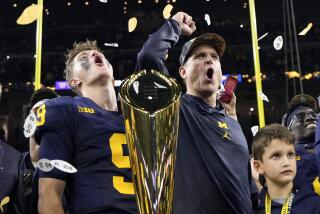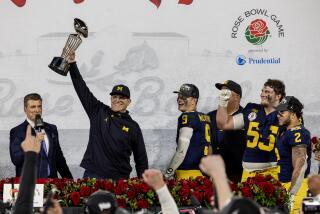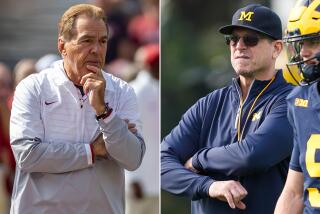Column: Oklahoma chosen for College Football Playoff over Georgia, Ohio State
The conversation started heating up a couple of weeks ago, as members of the College Football Playoff selection committee got an inkling that their job might not be so easy.
Things didn’t get any quieter or smoother when they huddled Saturday night to render a final decision on their postseason bracket.
The first three slots were easy enough to fill with undefeated Alabama, Clemson and Notre Dame. It was the fourth spot that gave them trouble, some voters favoring Oklahoma, others leaning toward Georgia or Ohio State.
“There was division,” committee chairman Rob Mullens said, adding: “Boy, did we debate.”
If nothing else, this weekend reinforced the notion that football isn’t like other college sports that have large playoff fields and can rely heavily on statistical data. The CFP has its protocol but always leaves room for opinions, or what voters call “the eye test.”
On Sunday afternoon, a few hours after Oklahoma was chosen over the other two contenders, Mullens and CFP executive director Bill Hancock met with reporters to discuss the process.
“Everybody obviously knew this was the end,” Hancock said of the season’s final Top 25 rankings. “They looked at every possible combination of those three teams.”
The 2018-19 playoffs will pit Alabama against Oklahoma in a Dec. 29 semifinal at the Orange Bowl. The same day, Clemson will play Notre Dame in the Cotton Bowl. The winners will meet for the national championship in Santa Clara on Jan. 7.
The selection committee’s 13 members, who also determined matchups for the other New Year’s Six bowl games, started working on this lineup Friday, gathering at a resort north of Dallas to watch conference championship games on television.
Discussions began in earnest around 11 p.m. Saturday.
Some fans might question the wisdom putting the Fighting Irish at No. 3 as an independent that did not have to play for a conference title. Mullens cited their 12-0 record and quality wins over Michigan, Northwestern and Syracuse.
“Notre Dame was part of that discussion for a small piece,” he said. “And then we went about really finding out who that fourth team was going to be.”
Three voting members had to recuse themselves: Ohio State athletic director Gene Smith, Oklahoma athletic director Joe Castiglione and former coach Frank Beamer, whose son is on the Sooners staff.
Disagreement over the final slot is not uncommon. The committee went through a similar tussle with Ohio State, Texas Christian and Baylor in 2014. Last season was contentious, too.
This time around, voters began by chewing over the pros and cons for each of the candidates.
They liked Oklahoma’s high-scoring offense and the fact that the 12-1 Sooners, after losing to Texas in early October, rebounded to defeat the Longhorns in the Big 12 title game. But the defense was suspect, which bothered traditionalists on the committee.
Georgia’s two losses were a problem, but they came against top-ranked Alabama and No. 11 Louisiana State. Plus, the Bulldogs took the Crimson Tide down to the wire in the Southeastern Conference championship Saturday night.
“Based on the teams that we’ve played this year, I think this team [Georgia] deserves to be in the playoff as well,” Alabama coach Nick Saban had told reporters shortly before the committee began deliberating. “I sure as hell don’t want to play them again.”
As the third contender, 12-1 Ohio State possessed the season’s most impressive victory, a 62-39 dismantling of then-No. 4 Michigan. But the Buckeyes also had the worst defeat, a 29-point loss to unranked Purdue.
Even before his team took the field against Northwestern for the Big Ten championship, coach Urban Meyer saw the final score from the Big 12 and suspected Oklahoma would be “hard to jump” in the rankings.
It crossed his mind that another blowout victory might help, but that would be tough against a team like Northwestern. When the Buckeyes failed to separate themselves from the pack with a 45-24 win, Meyer appreciated the challenge that voters faced.
“There are some great people on that committee,” he said Sunday. “That was a tough job.”
It was no surprise that voters were still trying to reach a consensus past midnight Saturday. After a couple hours’ break for sleep, they resumed early Sunday morning, turning to a list of criteria in hopes of breaking the logjam.
The CFP protocol takes into account conference championships, strength of schedule, head-to-head competition and outcomes against common opponents.
Not that statistics and data points could bail the voters out entirely. Georgia, for instance, had the toughest schedule but lacked a conference title. Ohio State had the title, but still ended up No. 6 behind the Bulldogs.
Asked about these seeming contradictions, Mullens echoed a common playoff refrain, saying: “This is an art, not a science.”
In the end, neither he nor Hancock could — or would — provide a straightforward reason for the decision, saying only that members considered all the information, took a vote and chose Oklahoma.
“We’re very clear on the charge, to get the four best teams,” Mullens said. “Obviously reasonable minds can disagree on what that looks like.”
Meyer seemed to accept that his team was headed for Pasadena to face Pac-12 champion Washington in the Rose Bowl. At Georgia, coach Kirby Smart expressed surprise at being edged out but acknowledged that the loss to Alabama — no matter how close — had been costly.
His Bulldogs ended up in the Sugar Bowl with Texas.
“We had an opportunity,” Smart told ESPN. “We didn’t take full advantage of it.”
Though people in and around college football will probably continue questioning this season’s final four, Hancock insisted university presidents and conference commissioners who oversee the playoffs have expressed no desire to expand the bracket.
“We look at it every year,” he said. “Haven’t changed it and I don’t feel we need to change it this time, either.”
The executive director suggested that heated discussions over the fourth slot — he called them “pointed but not unprofessional” — were exactly what the playoff creators had in mind.
“We wanted diverse opinions, we wanted people who would not hesitate to state their opinions,” he said. “And man, we got it.”
Follow @LAtimesWharton on Twitter
More to Read
Go beyond the scoreboard
Get the latest on L.A.'s teams in the daily Sports Report newsletter.
You may occasionally receive promotional content from the Los Angeles Times.











